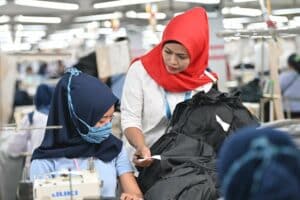The moment a motorcycle hit Lina Karliana was one that would haunt her for years to come, as she still relives the seconds before she blacked out in the middle of the road.
“When I was hit, I fell. I remembered nothing and did not hear my husband and child. I was afraid that something happened to my child, and my husband was sprawled in the middle of the road, Luckily, neither of them was physically hurt.” said Lina.
Having witnessed a truck run over her friend, she became even more troubled. Since then, she would shudder even from touching the motorcycle seat. She said she would rather walk to work than feel anxious riding the motorcycle.
She would often cry, imagining how her children would feel if she had an accident as she goes to work or on the way home. For the past eight years, Lina has been a line leader at garment factory PT Leading Garment Industries in Bandung, West Java where she has worked since 1999.

“[The memories] haunted me every day, every minute,” said Lina. “For two years, I was in so much pain.”
But it all changed when she joined Better Work Indonesia’s stress management training. She remembered how she was first speechless and began to cry when the trainer asked her to identify her biggest problem. She added that she was first sceptical about the solutions her trainers offered.
However, she gradually practiced what her trainers recommended for example like sharing with someone that she trusts and facing her own fear until she no longer felt worried riding the motorcycle to work. One day, she arrived at the factory without any complaints even though her husband had ridden the motorcycle a lot faster than usual.
“At that moment, I thought, ‘Maybe, I am healed’,” said Lina.
Lina’s stories highlight the importance of stress management programmes for workers. Better Work Indonesia is committed to promoting such initiatives. During the height of the COVID-19 pandemic, for instance, Better Work Indonesia developed an online stress management training for factory workers and management to help participants prevent stress from the constant negative news surrounding the pandemic. This virtual training reached 64 factories, creating space for participants to interactively share their feelings and navigate ways to overcome stress with an expert. Practical information, tips and exercises to manage emotions were also shared, with a series of videos remaining accessible even after the training.
More broadly, Better Work Indonesia aims to help managers and workers to self-diagnose and resolve problems through training, among other approaches. Aside from stress management, the programme has also been focusing on communication, negotiation and supervisory skills, industrial relations, occupational safety and health (OSH) and harassment prevention. Thousands of factory workers have benefited from Better Work Indonesia’s training programs.
The International Labour Organization (ILO) also addresses mental health issues as part of OSH related policies established by ILO Conventions No. 155, 161, and 187. ILO has also developed Stress Prevention at Work Checkpoints to improve workplace conditions and prevent stress at work. Furthermore, the World Health Organization (WHO) and ILO recently published a joint policy brief that focuses on the prevention of psychosocial risks, protection and promotion of mental health and support of workers with mental health conditions, so they can participate and thrive in the world of work.
Meanwhile, Lina is ready to aim higher after overcoming her fears and trauma. “Who doesn’t want to be better?” she notes.